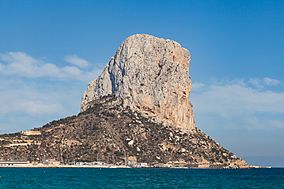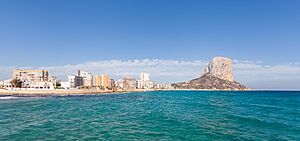Penyal d'Ifac Natural Park facts for kids
Quick facts for kids Penyal d'Ifac |
|
|---|---|
| Peñón de Ifach | |
|
IUCN Category V (Protected Landscape/Seascape)
|
|
 |
|
| Location | Marina Alta Comarca, Province of Alicante, Valencian Community, Spain |
| Nearest city | Calpe (3.2 km (2 mi)) and Alicante (66 km (41 mi)) |
| Area | 47 ha |
| Established | 1987 |
| Governing body | Generalitat Valenciana |
The Penyal d'Ifac Natural Park (also known as Spanish: Parque Natural del Peñón de Ifach or Valencian: Parc Natural del Penyal d'Ifac) is a special natural park located in Calpe, in the Valencian Community, Spain.
The Penyal d'Ifac is a huge rock made of limestone that rises right out of the sea. It's connected to the land by a narrow strip of rocks. This amazing place is home to many rare plants (some found nowhere else!), over 300 kinds of animals, and is a special nesting spot for sea birds.
This amazing rock is 332 meters (about 1,089 feet) tall! It's a super noticeable landmark along the Mediterranean coast. Long ago, people called Phoenicians knew it as the 'Northern Rock.' They used this name to tell it apart from the Rock of Gibraltar to the south.
Behind the Penyal d'Ifac, there's a big lagoon. Sandy beaches separate this lagoon from the sea. This wetland area is what's left of much larger wetlands that used to cover the Marina Alta region.
People worked hard to protect the unique plants and animals here. Because of their efforts, the area became a natural park in January 1987. With an area of 45 hectares (about 111 acres), it's the smallest natural park in Spain, and maybe even in Europe! The park goes from sea level all the way up to the top of the rock.
From the very top of the rock, you can see all the nearby villages and the countryside. On a clear day, you might even see as far as Ibiza in the Balearic Islands across the sea!
Contents
Amazing Plants of Penyal d'Ifac
The rock's steep cliffs and rocky slopes face the sea winds on three sides. This creates many different tiny environments, called microhabitats. These special spots allow a wide variety of unique plants to grow here.
At the lowest parts, where the soil is deeper and holds more moisture, you'll find typical Mediterranean plants. These include small palm trees, juniper bushes, lavender, and white pine trees.
Higher up, the soil gets thinner and is more exposed to the sun and wind. Here, you'll see mountain-loving plants growing in cracks and small valleys in the rock. The Ifac silene (Silene hifacensis) is a very rare plant that was first found on this rock. Sadly, it has now disappeared from this exact spot. Experts believe fewer than 20 adult plants are left in the wild. You might also see Phoenix dactylifera palm trees, which have spread naturally from nearby planted areas.
Wildlife and Animals of the Rock
The rock face offers perfect nesting spots for many birds. You can find birds of prey like peregrine falcons and Eleonor's falcons. Sea birds, such as gulls and cormorants, also nest here. Other birds that like rocky places make their homes on the Penyal d'Ifac too. You might even spot some semi-domesticated cats living near the peak!
Underwater World: Marine Life
The seabed around Penyal d'Ifac is very diverse. It has rocky areas, stony parts, and sandy spots. These different environments provide shelter for a wide variety of marine animals and plants. It's like an underwater city full of life!
See also
 In Spanish: Parque natural del Peñón de Ifach para niños
In Spanish: Parque natural del Peñón de Ifach para niños
 | William Lucy |
 | Charles Hayes |
 | Cleveland Robinson |


